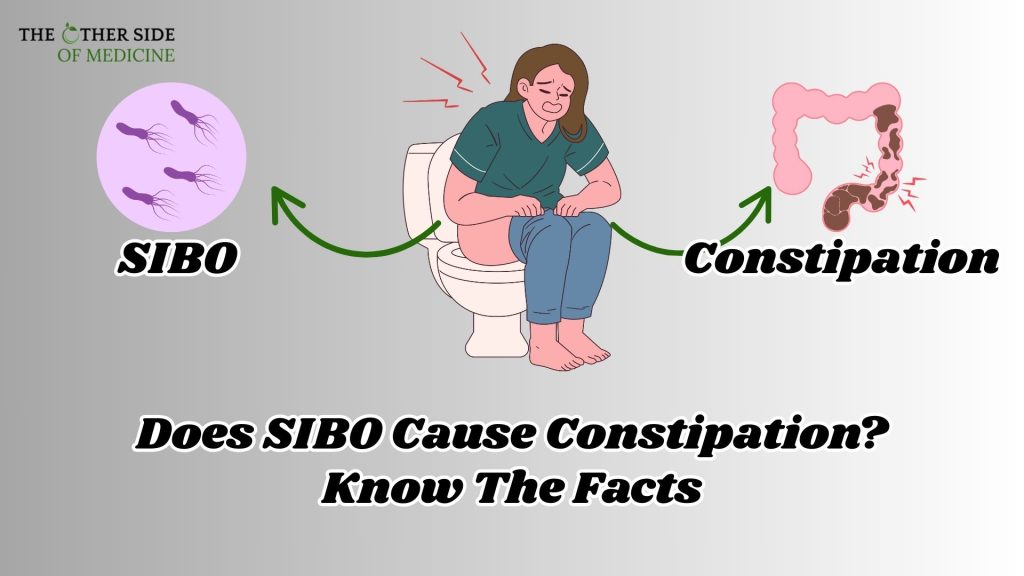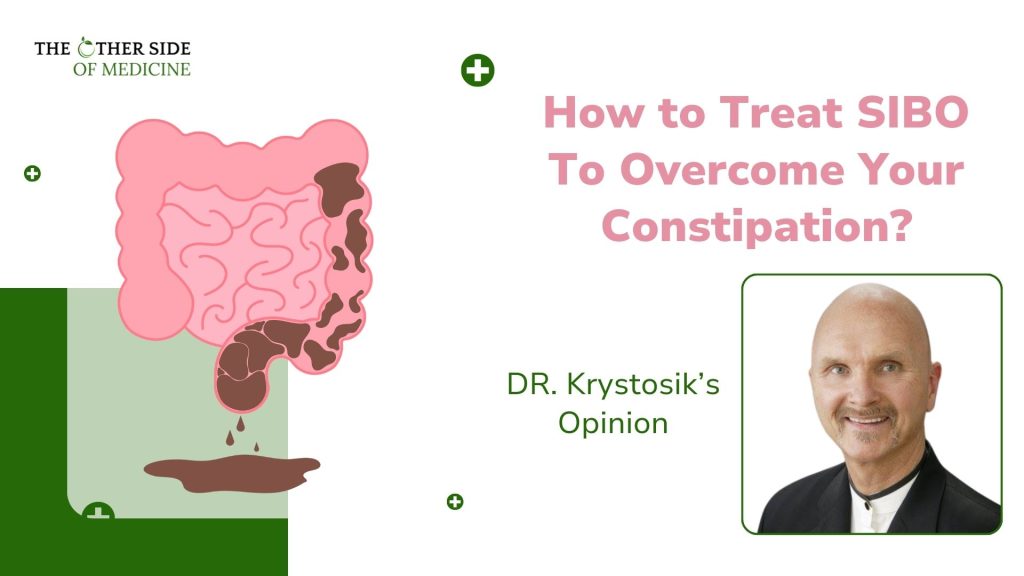As a functional medicine physician, I’ve had countless patients ask me, “Does SIBO Cause Constipation?” From my clinical experience, the answer is yes, and it’s more common than people think. While SIBO is often associated with bloating or diarrhea, many of my patients struggle primarily with constipation.
This happens when methane-producing bacteria in the small intestine disrupt normal digestion and slow bowel movements. Unfortunately, many cases go undiagnosed or misdiagnosed for years.
By understanding how SIBO can lead to constipation, the root cause can be treated — not just providing temporary relief, but a real, lasting solution.
Can SIBO Cause Constipation?
Small Intestinal Bacterial Overgrowth (SIBO) can cause constipation, especially in methane-dominant cases. The presence of microorganisms called archaea in the small intestine is a common clinical finding in SIBO. Archaea slow intestinal motility, making it difficult for stool to pass through the digestive tract.
This condition, also known as methane-dominant SIBO, is often overlooked in conventional diagnostics. Consequently, the gut’s natural peristalsis (wave-like motion) weakens, leading to persistent, hard-to-treat chronic constipation.
How Does SIBO Cause Constipation?
If you are suffering from SIBO-related constipation, you might like to know how SIBO can cause this issue in your health.

Excess Methane Gas Slows Motility
In methane-dominant SIBO, archaea produce methane gas, which slows down the wave-like contractions (peristalsis) of your intestines. This sluggish movement leads to:
- Hard, dry stools that are difficult to pass
- Infrequent bowel movements, sometimes just 1–2 times per week
- A feeling of incomplete evacuation after bowel movements
Disrupted Gut-Brain Communication
Your digestive system is closely connected to your brain through the vagus nerve. When bacterial overgrowth triggers inflammation in the gut, it disrupts signals to the brain. The result is:
- Reduced signaling to trigger bowel movements
- Erratic motility patterns, alternating between constipation and diarrhea
The Connection Between Nutrient Deficiencies and Muscle Function
SIBO can interfere with nutrient absorption, especially magnesium and B vitamins, which are vital for muscle contraction and relaxation. Low levels of these nutrients:
- Weakened bowel muscle tone
- Make peristalsis less effective
How to Determine if Your Constipation is Caused by SIBO?
Attempting to treat SIBO with fiber supplements or laxatives will provide little to no real improvement. That’s because constipation triggered by SIBO is rooted in microbial imbalance, not just poor diet or hydration.
Here’s what to watch for:
- Constipation doesn’t improve with standard remedies: Fiber, probiotics, and stool softeners fail to bring long-term relief.
- Bloating even without eating: Persistent bloating throughout the day, often worse after meals.
- Excessive gas and burping: Especially in the absence of common trigger foods.
- A heavy, sluggish feeling in the gut: The “feeling” that food is sitting undigested in the gut for hours.
- Brain fog and fatigue: Often associated with digestive discomfort.
One of the primary diagnostic tests I order when SIBO is suspected is the non-invasive SIBO breath test. I employ this test to confirm the presence of methane-producing microbes like archaea.
Common Symptoms of Methane-Dominant SIBO
In my clinical experience, patients with methane SIBO often report a consistent cluster of symptoms:
- Severe or frequent constipation: One or more days without a bowel movement.
- Abdominal bloating and fullness: Even when meals are small and healthy choices are made.
- Dry, hard stools: Requiring straining, leading to hemorrhoids or fissures.
- Persistent gas and belching: A result of fermenting carbs and dysbiosis.
- Nausea after eating: Caused by slowed stomach emptying.
- Skin irritations and fatigue: Toxins from SIBO can affect multiple systems in the body.
- Unexplained weight gain or difficulty losing weight: Often linked with SIBO and resulting disruption of metabolism.
These symptoms aren’t random digestive complaints. They’re clear indicators of gut microbial imbalance that must be treated properly.
Why Conventional Treatments Don’t Work Long-Term?
Many patients pay a visit to me frustrated after trying over-the-counter or even prescription solutions for SIBO symptoms that only provide short-term relief. The reason? These treatments don’t address the root cause.
Why Fiber and Laxatives Fall Short?
- Fiber can feed the wrong bacteria, worsening bloating.
- Laxatives may force bowel movements but create dependency.
- Antibiotics like rifaximin may help temporarily, but don’t restore gut flora balance or motility.
This is why I emphasize a functional medicine approach to SIBO and constipation — it’s not about suppressing symptoms, it’s about creating long-lasting relief of symptoms.
Functional Medicine Approach to SIBO & Constipation

Here’s how I treat SIBO-related constipation:
- Functional Testing: I start with a personalized gut assessment, including a SIBO breath test and stool analysis, to determine the specific type of SIBO and the extent of the microbial overgrowth.
- Targeted Herbal Antimicrobials: Instead of broad-spectrum antibiotics, I use natural antimicrobials like herbs or homeopathic remedies to reduce overgrowth gently and effectively.
- Personalized Diet Tailored to Gut Healing: I recommend a specific blood test to determine which foods are triggering delayed food reactions and subsequent inflammation. I recommend a whole food, primarily plant diet to reduce inflammation and support optimal nutrient absorption.
- Support for Gut Motility: Natural prokinetics such as ginger and artichoke help stimulate the migrating motor complex (MMC) — the natural cleaning wave of your small intestine.
- Repair the Gut Lining: With supplements like aloe vera gel, zinc carnosine, and collagen, we rebuild the gut barrier to reduce inflammation and support long-term function.
- Fermented Foods. I recommend fermented foods such as sauerkraut, refrigerated pickles, kombucha, miso, kimchi, pickled beets, plain dairy free yogurt (no sugar). Start introducing these fermented foods into your diet slowly so you don’t worsen symptoms while helping to rebalance the microbiome. The beneficial bacteria in fermented foods will kill off the harmful bacteria, so you want to introduce these foods into your diet slowly. I recommend a tablespoon of 2 or 3 of these foods a couple of times per day. Increase the quantity as your body tolerates them.
This natural, step-by-step protocol is designed for lasting relief.
When to Seek Help? My Clinical Experience with SIBO-Related Constipation
If you’ve been struggling with constipation that doesn’t respond to diet or medication, and you’re also experiencing bloating, fatigue, and food sensitivities, it’s time to test for SIBO.
I’ve helped many hundreds of patients reclaim their digestion and energy by identifying methane-dominant SIBO as the hidden culprit. Early intervention can prevent complications and avoid the trap of long-term laxative or medication use.
Ready to Address the Root Cause?
If you suspect SIBO is the root cause of your constipation, don’t wait. As a functional medicine practitioner, I offer a free 15-minute telehealth consultation to determine if I can help your digestive problems with a personalized plan that heals your gut from the inside out.
